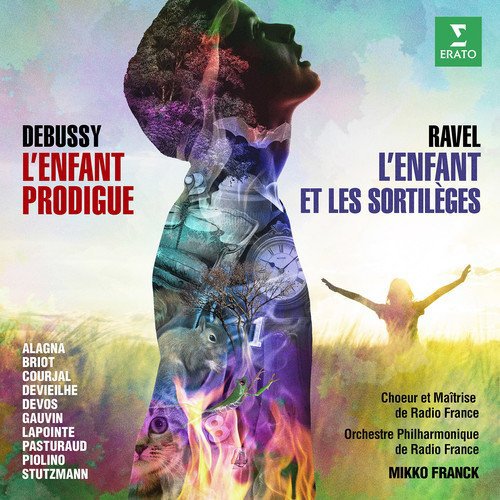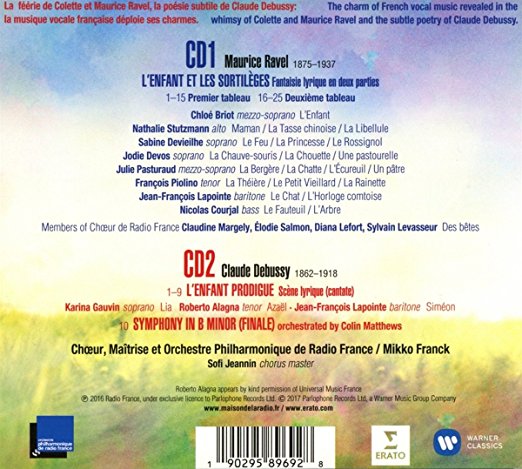Unjustly neglected French operatic works. The Debussy disc is variable in performances and sound.6/20/2017 This release caught my eye for three basic reasons: 1. the relative rarity of the pieces by my two favorite French composers; 2. conductor Mikko Franck (who should be better known); and, 3. the appearance of a recreated single movement of a "symphony" by Debussy, as orchestrated by Colin Matthews.
I will comment only on the Debussy works on disc 2, as I have not yet listened to the Ravel. Debussy's cantata, L'Enfant Prodigue (The Prodigal Son) is most often heard (if at all) in a revised, shortened version, fashioned by Debussy himself, as a "lyric scene in one act". The woefully inadequate informational text contained with this release's booklet states this performance of the complete, "fascinating", original version "should prove to be a real discovery" - thereby suggesting, without outright claiming, this is its first recording. I am no expert on this piece and will not pretend I can confirm or deny the assertion. What I can say is that it is a remarkable piece, full of wonderfully lyric vocal writing, which one can - with just a little imagination - recognize as being written by a young Debussy. The singing in this performance is, with one exception, glorious. Soprano Karina Gauvin possesses a magnificent voice, with a richly resonant, dark coloration and much emotional expression. Baritone Jean-Francois Lapointe is also sensitive and musically pleasing. The spoiler here is a significant detriment and comes as a real surprise - tenor Roberto Alagna sounds absolutely awful. His French pushes his vocal focus unnaturally up and out of his nose and his tone sounds extremely nasal and sour. Worse, he sounds extremely strained - uncomfortably reaching for any note above the staff with obvious lack of proper vocal technique. I hadn't heard Alagna on record in several years, and indeed did not know it was him until after I listened to the disc and grabbed the booklet to find out what tenor could be so bad. Learning it was Alagna, I am completely shocked at his vocal decline. His contribution alone disfigures this performance for me - not only in his solo passages, but even more ruinously in the concluding trio, where he simply cannot blend with the other two soloists, belting (almost shouting) his way unnaturally to be heard without proper support. Alongside the accomplished and beautiful singing of the other two, Alagna sounds excruciatingly strained, like a strangled calf. I am most perplexed by what I hear. Erato's sound for the cantata is perfectly fine. They certainly cannot be blamed for the sound of this tenor. Next comes a real rarity in the form of a completed single movement of a symphony, orchestrated by Colin Matthews. The track listing states Symphony in B minor (Finale). And that is all we know about it based upon this release. As noted above, Erato's booklet notes are an inadequate afterthought - there is not a single word provided about the symphony! I know from experience that Colin Matthews is not the first to take a stab at the symphony fragment. Naxos recorded it in 2011 in an orchestration made by Tony Finno. That reading is part a comprehensive collection of Debussy orchestral works conducted by Jun Markl for Naxos. In any event, I am baffled why this slight, completely forgettable fragment has garnered any interest, much less by two different orchestrators and conductors. There just really is nothing to it and sounds completely disjointed and cobbled together. It has not a whit of adventure, eager discovery, or a coherent collection of musical thought of a young composer, such as displayed in abundance in early symphonies by composers such as, say, Bizet and Dukas. And based upon Colin Matthews's orchestration of it, it isn't a well-crafted result, and is poorly orchestrated. Whatever the source material, it is not well suited to the symphony orchestra (perhaps it would work better as a piano piece?), especially in Matthews's thick orchestration. He often scores unnecessary doublings (brass and low strings seemed joined at the hip) and there are several instances of unsympathetic and uncharacteristic writing for certain instruments. For example, there are several ridiculously high passages for the 1st trumpet which sound ill-suited for the trumpet and completely out of character for Debussy - or any competent composer for that matter. Erato's recorded sound takes a significant nose-dive for this purely orchestral track as well. It sounds rather thick, congested and cramped, and is not terribly refined on those weird trumpet outbursts. And regarding Erato's lack of informative documentation, I found it interesting that Amazon felt it necessary and advantageous to include an "editorial review" on their listing for this release which at least makes mention of this symphony fragment. Erato apparently forgot they even recorded it. They do, however, include a full libretto translation for both main vocal works. The Ravel on disc 1 will have to be extraordinarily good in every way for me to provide even a guarded recommendation for this release. Based upon disc 2, what we have here is so variable - and in many respects abysmal - that I cannot recommend it, other than for the glorious singing of Karina Gauvin - which I suppose in and of itself merits at least a listen.
0 Comments
Leave a Reply. |
Proudly powered by Weebly


 RSS Feed
RSS Feed